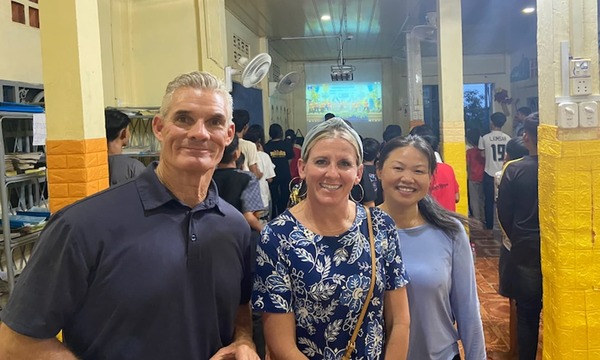Benjamin was a baseball player. The young teen ran and played hard, enjoying the game as much as the sweat. But when he had to have a limb salvage operation in his leg due to cancer, it ended his hopes of playing a competitive sport.
Then, one month ago, his hospital caseworker, cancer survivor Jenee Areeckal, convinced him to attend a tennis clinic at Biola University for cancer patients who have lost limbs. Although reluctant to go, by the end of the clinic Benjamin realized he could compete in a sport once again.
“His chemo makes him weak, but tennis is giving him something to look forward to,” said Biola’s women’s tennis head coach, Dee Henry.
Henry started coordinating the clinics three years ago after visiting Children’s Hospital of Orange County [CHOC] and meeting Areeckal. As Areeckal battled through chemotherapy, a friend suggested she spend an afternoon with Henry on the courts. They met shortly after and played for hours.
“She said, ‘This was an amazing experience that brought normality back to my life,’” Henry said of their conversation walking off the court. “She wanted to do something like that for her kids at the hospital.”
The second annual clinic at Biola, in honor of Children’s Cancer Awareness Month, was held Sept. 18, 2010. Benjamin is one of the young people this program is giving hope to. So far, he has attended two other clinics that Henry holds for wheelchair tennis players on Monday nights at Biola. She sees him going far in the game.
“He doesn’t live in a chair so he not only has to learn tennis strokes, but must learn to move in a chair,” said Henry. “His natural eye-hand coordination and desire to learn makes him the player to watch.”
The clinics serve as an introduction to tennis for most of the kids and provides a change of scenery where the attendees can use Biola equipment, practice on collegiate tennis courts and learn from Biola’s varsity tennis players.
Biola junior Danielle Calbeck was one of the varsity players who assisted at the clinic on Sept. 18. She helped players warm up and was able to volley with them as well.
“I have so much respect for these individuals that have been through so much, but want to come out and just have fun,” said Calbeck. “They don’t dwell on the past, but look towards the future, which I think is a wonderful and rare gift to have.”
The involvement of Biola’s student athletes is one of the reasons Henry continues the clinics each year, saying each of the students involved reported having an amazing experience. Calbeck enjoyed making friends with the players at the clinic and enjoyed seeing a few of the same individuals at the wheelchair tennis clinic on Mondays.
“People are coming a long way, because there aren’t programs for people with special needs,” said Henry. “For kids like Benjamin, tennis is giving him a game he can compete in.”
Learn more about Biola athletics and Biola’s women’s tennis program.
Written by Jenna Bartlo, Media Relations Coordinator. Jenna can be reached at (562) 777-4061 or through email at jenna.l.bartlo@biola.edu.
 Biola University
Biola University
_(1).jpeg)
.jpg)